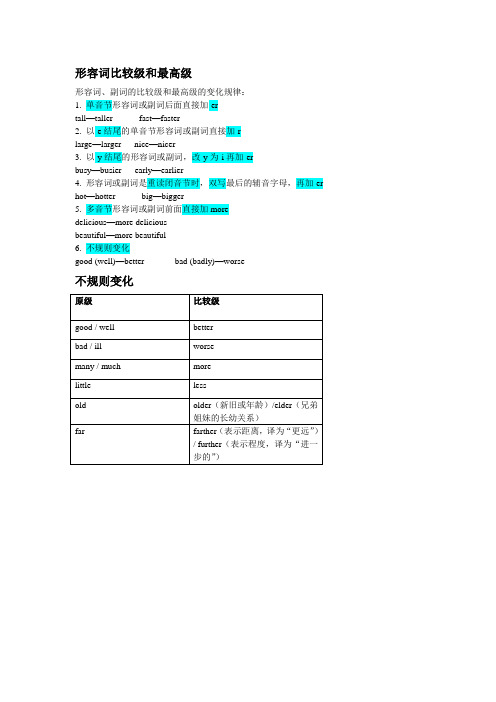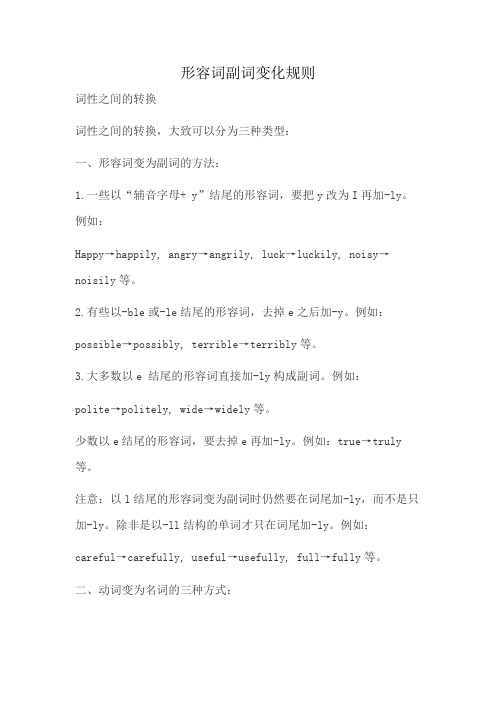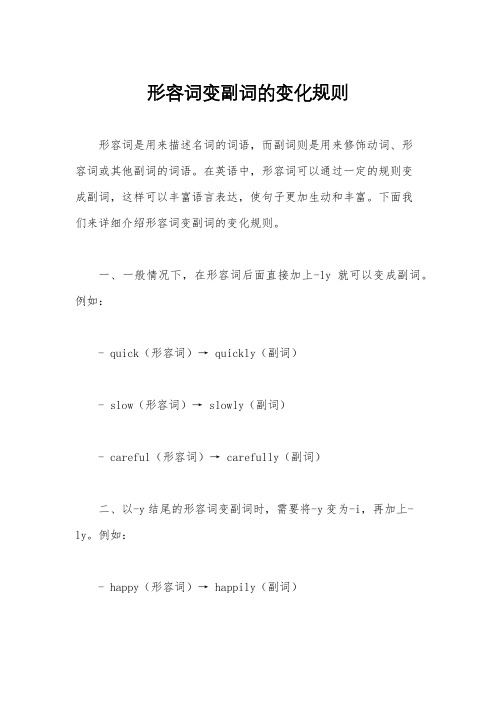(完整word版)形容词变副词规律总结(图表)
形容词变副词规律

形容词变副词通常是加ly,其变化有规律可循,请记住以下口诀:一般直接加,“元e”去e加ly,“辅y”改i加,“le”结尾e改y。
分别举例如下:quick-quickly; true-truly;happy-happily; possibl e-possibl y具体规则如下:1.一般情况下直接加“ly”,如:quick-quickly;polite-politel y;sad-sadly;immedia te-immedia tely;recent-recentl y2.少数以元音字母加e结尾的形容词,要去掉e再加-ly。
如:true-truly; due-duly绝大多数辅音字母加e结尾的形容词直接加-ly。
如:polite-politel y;wide-widely;wise-wisely; nice-nicely3.以“y”结尾的,且读音为/ i /,先将“y”改成“i”,再加“ly”,如:happy-happily;heavy-heavily;angry-angrily;busy-busily但是如果读音为/ ai /,直接加ly,如:dry-dryly; sly-slyly;shy---shyly4.以ic结尾的词,加ally,如:economi c-economi cally;basic-basical ly;scienti fic-scienti ficall y;automat ic-automat ically; energet ic-energet ically; 但是publi c-publicl y例外。
5.以辅音字母加l e结尾时,去e加y,如:simple-simply;conside rable-conside rably;terribl e-terribl y comfort ablygentle-gently;possibl e-possibl y;probabl e-probabl y; incredi ble-incredi bly元音字母加le时加ly,如:sole-solely。
(完整版)形容词变副词的变化规则

形容词变副词:形容词+ly构成副词的规则:情况大凡情况构成加-ly例词与练习例:quick-quickly练:brave-care-少数以元音去e加-ly字母+e结尾大部分+e结加-ly尾的词直接辅音字母+y将y改为i结尾le结尾再加-ly去e加-y例:true-truly练:due-例:nice-nicely练:wise-wide-例:easy-easily练:happy-heavy-例:simple-simply练:possible-comfortable-ll结尾只加-y例:full-fully练:dull-ic结尾的词(public-publicly例外)加-ally例:basic-basically练:scientific-automatic-不规则变化:1.本身既是形容词也是副词,无需改变:fast----fast,early----early,high----high,hard----hard,late----late,far----farwide----wide, alone----alone2.虽然以ly结尾,但却是形容词,不能直接用来修饰动词:friendly,lively,lovely,lonely,likely, motherly, manly等。
3.有些形容词本身即为副词,同时也有加-ly的副词形式。
但加不加ly意思不一样,使用时需注意,如:late(形容词,晚的)---late(副词,晚地),lately(最近)high(形容词,高的)--high(副词,高地),highly(副词,高度地,恨非常)。
(word完整版)(总)形容词比较级和最高级规律和不规则变化

原级
比较级
good / well
better
bad / ill
worse
many / much
more
little
less
old
older(新旧或年龄)/elder(兄弟姐妹的长幼关系)
far
farther(ห้องสมุดไป่ตู้示距离,译为“更远”)/ further(表示程度,译为“进一步的”)
形容词比较级和最高级
形容词、副词的比较级和最高级的变化规律:
1.单音节形容词或副词后面直接加-er
tall—taller fast—faster
2.以-e结尾的单音节形容词或副词直接加-r
large—larger nice—nicer
3.以-y结尾的形容词或副词,改-y为-i再加-er
busy—busier early—earlier
4.形容词或副词是重读闭音节时,双写最后的辅音字母,再加-er
hot—hotter big—bigger
5.多音节形容词或副词前面直接加more
delicious—more delicious
beautiful—more beautiful
6.不规则变化
good (well)—better bad (badly)—worse
形容词变副词的变化规则(名词修改):量词变化规则

形容词变副词的变化规则(名词修改):量词变化规则在中文中,形容词可以通过添加特定的后缀来转化为副词。
副词在句子中用来修饰动词、形容词或其他副词,用于描述行为的方式、时间、地点等。
形容词变副词的一般规则大多数形容词可以通过在词尾添加"地"的方式变为副词。
例如:- 高(形容词)→ 高兴地(副词):他高兴地笑了。
- 慢(形容词)→ 慢慢地(副词):他慢慢地走出了房间。
一些特殊情况一些形容词的变副词规则稍有不同。
例如:- 好(形容词)→ 好好地(副词):他好好地休息了一整天。
- 快(形容词)→ 快快地(副词):他快快地冲进了教室。
名词修改的量词变化规则在中文中,名词可以通过添加量词来表示数量或度量单位。
量词可以用来描述某个事物的数量、大小等。
一般来说,常见的量词有很多种,根据名词的不同,选择适合的量词可以更准确地描述数量。
以下是一些常见名词修改的量词变化规则:1. 个:用于一些没有固定形状、没有自身单位的事物。
例如:- 一个苹果、一个人2. 只:用于一些有腿、有翅膀等生物。
例如:- 一只鸟、一只猫3. 条:用于一些条状物品。
例如:- 一条绳子、一条鱼4. 张:用于一些纸张、图片等扁平的物品。
例如:- 一张纸、一张照片5. 件:用于一些衣物、器具等。
例如:- 一件衬衫、一件家具需要注意的是,不同的名词可能有不同的适用量词,需要根据具体情况进行选择。
请根据具体的语境和需要选择合适的形容词变副词规则以及名词修改的量词变化规则。
形容词副词变化规则

形容词副词变化规则词性之间的转换词性之间的转换,大致可以分为三种类型:一、形容词变为副词的方法:1.一些以“辅音字母+ y”结尾的形容词,要把y改为I再加-ly。
例如:Happy→happily, angry→angrily, luck→luckily, noisy→noisily等。
2.有些以-ble或-le结尾的形容词,去掉e之后加-y。
例如:possible→possibly, terrible→terribly等。
3.大多数以e 结尾的形容词直接加-ly构成副词。
例如:polite→politely, wide→widely等。
少数以e结尾的形容词,要去掉e再加-ly。
例如:true→truly 等。
注意:以l结尾的形容词变为副词时仍然要在词尾加-ly,而不是只加-ly。
除非是以-ll结构的单词才只在词尾加-ly。
例如:careful→carefully, useful→usefully, full→fully等。
二、动词变为名词的三种方式:1.词形不变,词性改变。
例如:work, study, water, plant等词既可以用作动词,也可以用作名词。
2.一些动词在词尾加上-er或-or之后就变成了表示“某一类人”的名词。
例如:work→worker, teach→teacher, run→runner, invent→inventor, visit→visitor等。
3、在动词词尾加-ing变成名词。
例如:shop→shopping, swim→swimming, write→writing, build→building等。
三、名词变为形容词的七种方式:1.在名词后面加y,可以变成形容词。
例如:rain→rainy, luck→lucky, sun→sunny, fun→funny, noise→noisy, ice→icy等。
2.一些抽象名词在词尾加-ful变为形容词。
例如:care→careful, thank→thankful, help→helping, use→useful 等。
形容词变副词规律总结__(图表)

形容词变副词规律总结(图表)1. Mrs White smiled _____ ( happy) when she received a present from her daughter.2. Why do you think you did so ___________(terribe)in your test?3. We can __________(easy) forgive a child who is afraid of the dark, but we can’t forgive an adult who is afraid of the light.4. Congratulations! You’ve answered all the questions _________(correct).5. The computer is ______( wide)used in our daily life. We can do many things with it.6. I changed into my sports shoes so that I could walk more ____________(comfortabe).7. Mary passed her examination because she studied very ________( hard ).8. “Why didn’t you tell me earlier?” The boss shouted _______(angry).9. It’s ___(true) possible that robot teachers will be popular in schools some day.10. How _________(comfortable) the giant pandas are living in Taiwan!11. Miss Xu smiled and said to me ________(soft), “Never mind, my boy!”12. Last night it rained __________(heavy) in the southern part of the city.13. Simon hates to be like others, he often tires to do everything ______(different).14. ----Where is Peter from? ----He is French, if I remember _________(correct).15. The children clapped their hands _________(excited) as soon as the astronauts appeared on the stage.16. Tom had an accident yesterday. His teacher sent him to the hospital ____(quick).17. We should speak to the old man _________(polite)18. I’m _______(true) sorry I can’t go with you. I have a lot to do this afternoon.19. Nancy is patient and she doesn’t give up ________(easy).20.His father was looking _____ (angry) at him because he had made a serious mistake.21.Mike walked _______(quiet) into the room not to wake up his grandpa.22. How _______(quick) Betty answered the teacher’s question!23. The firemen have saved the boy from the fire ____________(successful). Keys: 1. happily 2.terribly 3. easily 4. correctly 5. widely 6. comfortably7. hard 8. angrily 9. truly 10. comfortably 11. softly 12. heavily 13. differently14. correctly 15. excitedly 16. quickly 17. politely 18. truly 19. easily 20. angrily21. quietly 22. quickly 23. successfully。
形容词和副词的转化规则分析

形容词和副词的转化规则分析形容词和副词是语言中常见的两种词性,它们在句子中起着描述和修饰的作用。
虽然形容词和副词有着不同的词性,但它们之间却存在一定的转化规则。
本文将对形容词和副词的转化规则进行详细分析。
一、形容词转化为副词形容词转化为副词是一种常见的转化方式,转化规则主要有以下几种:1. 形容词以-e结尾,变为副词时,去掉结尾的-e,再加上-y。
例如:- True(形容词)→ Truly(副词)- Late(形容词)→ Lately(副词)2. 形容词以-y结尾,变为副词时,将-y变为-i,再加上-ly。
例如:- Happy(形容词)→ Happily(副词)- Easy(形容词)→ Easily(副词)3. 形容词以-le结尾,变为副词时,将-le变为-ly。
例如:- Gentle(形容词)→ Gently(副词)- Subtle(形容词)→ Subtly(副词)4. 形容词以-ic结尾,变为副词时,将-c变为-cally。
例如:- Specific(形容词)→ Specifically(副词)- Economic(形容词)→ Economically(副词)5. 形容词以-ly结尾,本身已经是副词,无需进行转化。
例如:- Friendly(形容词/副词)- Likely(形容词/副词)需要注意的是,虽然大部分的形容词都可以通过上述规则转化为副词,但仍有个别形容词转化规则并不适用。
二、副词转化为形容词副词转化为形容词的规则相对较少,主要包括以下几种情况:1. 一些副词本身在句中就可用作形容词,不需转化。
例如:- Fast(副词/形容词)- Hard(副词/形容词)2. 将副词与连字符“-”结合,形成形容词。
例如:- Well(副词)→ Well-known(形容词)- High(副词)→ High-speed(形容词)总结起来,形容词和副词的转化规则在语言中起到了丰富词汇的作用,使得语言更加准确、生动。
形容词变副词的变化规则

形容词变副词的变化规则形容词是用来描述名词的词语,而副词则是用来修饰动词、形容词或其他副词的词语。
在英语中,形容词可以通过一定的规则变成副词,这样可以丰富语言表达,使句子更加生动和丰富。
下面我们来详细介绍形容词变副词的变化规则。
一、一般情况下,在形容词后面直接加上-ly就可以变成副词。
例如:- quick(形容词)→ quickly(副词)- slow(形容词)→ slowly(副词)- careful(形容词)→ carefully(副词)二、以-y结尾的形容词变副词时,需要将-y变为-i,再加上-ly。
例如:- happy(形容词)→ happily(副词)- busy(形容词)→ busily(副词)三、以-le结尾的形容词变副词时,通常将-le变为-ly。
例如: - gentle(形容词)→ gently(副词)- simple(形容词)→ simply(副词)四、有些形容词的变化规则比较特殊,需要记忆。
例如:- good(形容词)→ well(副词)- hard(形容词)→ hard(副词)- fast(形容词)→ fast(副词)五、有些形容词的副词形式与形容词形式完全相同,例如:- early(形容词)→ early(副词)六、有些形容词的副词形式是不规则的,需要通过阅读和积累来记忆。
例如:- high(形容词)→ high(副词)- low(形容词)→ low(副词)在英语中,副词的使用非常广泛,它可以修饰动词、形容词或其他副词,使句子更加丰富多彩。
因此,掌握形容词变副词的变化规则对于提高英语表达能力非常重要。
希望以上介绍能够帮助大家更好地掌握形容词变副词的变化规则,从而在日常生活和学习中更加流利地运用英语。
- 1、下载文档前请自行甄别文档内容的完整性,平台不提供额外的编辑、内容补充、找答案等附加服务。
- 2、"仅部分预览"的文档,不可在线预览部分如存在完整性等问题,可反馈申请退款(可完整预览的文档不适用该条件!)。
- 3、如文档侵犯您的权益,请联系客服反馈,我们会尽快为您处理(人工客服工作时间:9:00-18:30)。
形容词变副词规律总结(图表)已仔细核对,无错误,可放心下载
1. Mrs White smiled _____ ( happy) when she received a present from her daughter.
2. Why do you think you did so ___________(terribe)in your test?
3. We can __________(easy) forgive a child who is afraid of the dark, but we can’t forgive
an adult who is afraid of the light.
4. Congratulations! Y ou’ve answered all the questions _________(correct).
5. The computer is ______( wide)used in our daily life. We can do many things with it.
6. I changed into my sports shoes so that I could walk more ____________(comfortabe).
7. Mary passed her examination because she studied very ________( hard ).
8. “Why didn’t you tell me earlier?” The boss shouted _______(angry).
9. It’s ___(true) possible that robot teachers will be popular in schools some day.
10. How _________(comfortable) the giant pandas are living in Taiwan!
11. Miss Xu smiled and said to me ________(soft), “Never mind, my boy!”
12. Last night it rained __________(heavy) in the southern part of the city.
13. Simon hates to be like others, he often tires to do everything ______(different).
14. ----Where is Peter from? ----He is French, if I remember _________(correct).
15. The children clapped their hands _________(excited) as soon as the astronauts appeared on the stage.
16. Tom had an accident yesterday. His teacher sent him to the hospital ____(quick).
17. We should speak to the old man _________(polite)
18. I’m _______(true) sorry I can’t go with you. I have a lot to do this afternoon.
19. Nancy is p atient and she doesn’t give up ________(easy).
20.His father was looking _____ (angry) at him because he had made a serious mistake.
21.Mike walked _______(quiet) into the room not to wake up his grandpa.
22. How _______(quick) Betty answered the teache r’s question!
23. The firemen have saved the boy from the fire ____________(successful).
Keys: 1. happily 2.terribly 3. easily 4. correctly 5. widely 6. comfortably
7. hard 8. angrily 9. truly 10. comfortably 11. softly 12. heavily 13. differently
14. correctly 15. excitedly 16. quickly 17. politely 18. truly 19. easily 20. angrily 21. quietly 22. quickly 23. successfully。
